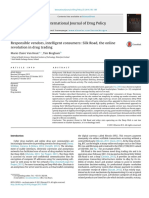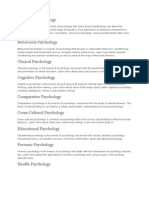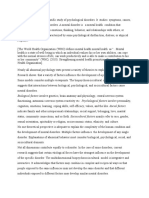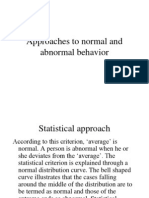0% found this document useful (3 votes)
2K views28 pagesAbnormal Psychology A Modern Approach 3rd Edition
The third edition of 'Abnormal Psychology: A Modern Approach' presents an integrative perspective on psychopathology, emphasizing the interplay of biological, psychological, and social factors in understanding psychological disorders. It incorporates contemporary frameworks like the DSM-5-TR and the Research Domain Criteria, while also addressing cultural and developmental considerations in mental health. The textbook is designed to engage students as active learners, providing comprehensive coverage of treatment approaches, research methods, and ethical considerations in the field.
Uploaded by
vonilal233Copyright
© © All Rights Reserved
We take content rights seriously. If you suspect this is your content, claim it here.
Available Formats
Download as PDF, TXT or read online on Scribd
0% found this document useful (3 votes)
2K views28 pagesAbnormal Psychology A Modern Approach 3rd Edition
The third edition of 'Abnormal Psychology: A Modern Approach' presents an integrative perspective on psychopathology, emphasizing the interplay of biological, psychological, and social factors in understanding psychological disorders. It incorporates contemporary frameworks like the DSM-5-TR and the Research Domain Criteria, while also addressing cultural and developmental considerations in mental health. The textbook is designed to engage students as active learners, providing comprehensive coverage of treatment approaches, research methods, and ethical considerations in the field.
Uploaded by
vonilal233Copyright
© © All Rights Reserved
We take content rights seriously. If you suspect this is your content, claim it here.
Available Formats
Download as PDF, TXT or read online on Scribd
/ 28
Find the Full Original Textbook (PDF) in the link
below:
CLICK HERE
Background and Conceptual Framework
The field of abnormal psychology has undergone
significant transformation over the past several
decades, evolving from early approaches rooted in
supernatural explanations and moral judgments to
sophisticated, evidence-based frameworks that
integrate biological, psychological, and social
perspectives. The third edition of "Abnormal
Psychology: A Modern Approach" by Brian L. Burke,
PhD, Megan C. Wrona, PhD, and their distinguished
co-authors Sarah E. Trost, PhD, Terri A. deRoon-
Cassini, PhD, and Douglas Bernstein, represents a
comprehensive and innovative survey of
contemporary understanding in the field of
psychopathology. Published by Academic Media
Solutions with a copyright date of 2023, this cutting-
edge textbook has been specifically designed to
connect with students and hold their attention like few
other books in the discipline.
The conceptual foundation of this textbook rests upon
the recognition that abnormal psychology cannot be
understood through any single theoretical lens or
methodological approach. Instead, the authors
advocate for an integrative perspective that
acknowledges the complex interplay of biological
vulnerabilities, psychological processes, social
influences, and cultural factors that contribute to the
development, maintenance, and treatment of
psychological disorders. This modern approach
reflects the current state of the field, which has moved
beyond simplistic explanations to embrace the
multifaceted nature of mental health and illness.
The authors' approach is characterized by a
commitment to treating students as serious learners
rather than passive recipients of information. The
textbook provides well-stated discussions of various
issues with the expectation that students are capable
of comprehending complex material and engaging
with controversial topics in a thoughtful and critical
manner. This pedagogical philosophy reflects a deep
respect for students' intellectual capabilities and their
potential to contribute meaningfully to the ongoing
dialogue about mental health and psychological
disorders.
Theoretical Integration and Contemporary Perspectives
The third edition exemplifies the modern trend toward
theoretical integration in abnormal psychology,
moving beyond the traditional divisions between
psychodynamic, behavioral, cognitive, and biological
approaches to embrace a more comprehensive
understanding of psychological disorders. The authors
recognize that each theoretical perspective
contributes valuable insights, but that no single
approach can adequately explain the complexity of
human psychological functioning and dysfunction.
The biopsychosocial model serves as the primary
organizing framework for the textbook, emphasizing
the importance of considering biological factors
(genetics, neurobiology, physiological processes),
psychological factors (cognition, emotion, behavior,
personality), and social factors (family relationships,
cultural context, socioeconomic status,
environmental stressors) in understanding the
etiology, course, and treatment of psychological
disorders. This integrative approach reflects the
current scientific consensus that psychological
disorders result from complex interactions among
multiple levels of influence rather than single causal
factors.
The authors also incorporate contemporary
perspectives such as the Research Domain Criteria
(RDoC) framework developed by the National Institute
of Mental Health, which emphasizes the importance
of understanding psychological disorders in terms of
underlying biological and psychological mechanisms
rather than relying solely on symptom-based
classification systems. This forward-thinking
approach prepares students to engage with emerging
developments in the field and to think critically about
the evolution of diagnostic systems and treatment
approaches.
DSM-5-TR Integration and Diagnostic Considerations
One of the most significant strengths of the third
edition is its excellent integration of the Diagnostic
and Statistical Manual of Mental Disorders, Fifth
Edition, Text Revision (DSM-5-TR) diagnostic criteria
with comprehensive explanations of the theoretical
and empirical foundations underlying these
classifications. The authors provide detailed coverage
of diagnostic criteria while also encouraging students
to think critically about the strengths and limitations
of categorical diagnostic systems.
The textbook addresses ongoing controversies within
the field regarding the reliability and validity of
psychiatric diagnoses, the dimensional versus
categorical approaches to classification, and the
cultural considerations that must be taken into
account when applying diagnostic criteria across
diverse populations. The authors invite students to
form their own informed opinions about these
controversial topics, fostering critical thinking skills
that are essential for future practitioners and
researchers in the field.
The integration of DSM-5-TR criteria goes beyond mere
listing of symptoms to include discussions of
differential diagnosis, comorbidity patterns, and the
clinical decision-making processes that inform
accurate diagnosis. Students learn about the
importance of comprehensive assessment, the role of
clinical judgment in applying diagnostic criteria, and
the ethical considerations involved in psychiatric
diagnosis. This comprehensive approach ensures that
students understand not only what the diagnostic
criteria are, but also how they are used in clinical
practice and what limitations they may have.
Research Methods and Evidence-Based Practice
The third edition places strong emphasis on research
methodology and evidence-based practice, reflecting
the field's commitment to scientific rigor and
empirical validation. Students are introduced to the
various research designs used in abnormal
psychology, including experimental studies,
longitudinal investigations, case studies, and
epidemiological research. The authors explain how
different research methods contribute to our
understanding of psychological disorders and how
research findings translate into clinical practice.
The textbook addresses the importance of evidence-
based treatment approaches, providing students with
an understanding of how therapeutic interventions are
developed, tested, and validated through controlled
clinical trials. Students learn about the hierarchy of
evidence, from case reports and case series through
randomized controlled trials and systematic reviews,
and how this evidence is used to inform treatment
guidelines and clinical decision-making.
The authors also address the challenges and
limitations of research in abnormal psychology,
including ethical considerations in research with
vulnerable populations, the difficulty of conducting
controlled studies of severe psychological disorders,
and the importance of considering cultural factors in
research design and interpretation. This balanced
perspective helps students develop a sophisticated
understanding of how scientific knowledge is
generated and applied in the field of mental health.
Biological Foundations and Neuroscience Integration
The third edition provides comprehensive coverage of
the biological foundations of psychological disorders,
reflecting the dramatic advances in neuroscience and
genetics that have transformed our understanding of
mental health and illness. Students are introduced to
fundamental concepts in neuroanatomy,
neurophysiology, and neurochemistry that are
relevant to understanding psychological disorders.
The textbook covers the role of neurotransmitter
systems in various psychological disorders, including
the dopamine hypothesis of schizophrenia, the
monoamine theory of depression, and the GABA
system's involvement in anxiety disorders. However,
the authors are careful to present these biological
theories within a broader context that acknowledges
the limitations of simple neurochemical explanations
and the importance of considering psychological and
social factors as well.
Genetic influences on psychological disorders receive
thorough treatment, with discussions of heritability
studies, molecular genetics, and gene-environment
interactions. Students learn about the complex
relationships between genetic vulnerability and
environmental factors in the development of
psychological disorders, moving beyond simplistic
nature versus nurture debates to understand how
genes and environment interact in dynamic ways
throughout development.
The authors also address emerging areas such as
epigenetics, neuroplasticity, and the role of stress and
trauma in altering brain structure and function. These
contemporary developments help students
understand how biological and environmental factors
can influence each other across the lifespan,
providing a more nuanced understanding of the
relationship between biology and behavior.
Psychological Processes and Cognitive Mechanisms
The third edition provides detailed coverage of the
psychological processes and cognitive mechanisms
that contribute to the development and maintenance
of psychological disorders. Students learn about the
role of learning processes, including classical
conditioning, operant conditioning, and observational
learning, in the acquisition of maladaptive behaviors
and the development of psychological symptoms.
Cognitive factors receive extensive treatment,
including discussions of cognitive biases, information
processing deficits, and dysfunctional thought
patterns that characterize various psychological
disorders. The authors explain how cognitive theories
have evolved from early cognitive models to more
sophisticated information processing approaches that
consider the complex interplay between attention,
memory, and interpretation biases.
The textbook addresses the role of emotion regulation
in psychological disorders, exploring how difficulties
in identifying, understanding, and managing emotions
contribute to various forms of psychopathology.
Students learn about the neurobiological basis of
emotion regulation and how these systems can
become dysregulated in psychological disorders.
Personality factors and their relationship to
psychological disorders are also thoroughly
examined, including discussions of temperament,
personality traits, and personality disorders. The
authors explore how stable individual differences in
personality can serve as risk or protective factors for
the development of psychological disorders and how
personality and psychopathology interact in complex
ways.
Social and Cultural Considerations
The third edition demonstrates a strong commitment
to addressing social and cultural factors in abnormal
psychology, recognizing that psychological disorders
cannot be understood apart from their social and
cultural contexts. The authors provide comprehensive
coverage of how cultural factors influence the
expression, interpretation, and treatment of
psychological symptoms.
Students learn about cultural variations in the
manifestation of psychological disorders, including
culture-bound syndromes and the ways in which
universal psychological processes may be expressed
differently across different cultural contexts. The
textbook addresses the importance of cultural
competence in assessment and treatment, including
the need for culturally adapted diagnostic instruments
and therapeutic interventions.
The authors also address issues of social inequality
and their impact on mental health, including the
effects of poverty, discrimination, and social
marginalization on psychological well-being. Students
learn about the social determinants of mental health
and how structural factors in society can contribute to
the development and persistence of psychological
disorders.
The textbook includes discussions of how stigma and
discrimination affect individuals with psychological
disorders, both in terms of their access to treatment
and their overall quality of life. The authors explore
strategies for reducing stigma and promoting mental
health advocacy, helping students understand their
potential role in addressing social barriers to mental
health care.
Developmental Perspectives and Lifespan
Considerations
The third edition incorporates a strong developmental
perspective, recognizing that psychological disorders
must be understood within the context of normal and
abnormal development across the lifespan. Students
learn about how psychological disorders manifest
differently at different developmental stages and how
developmental factors influence the course and
prognosis of various conditions.
The textbook addresses childhood and adolescent
disorders in detail, including attention-
deficit/hyperactivity disorder, autism spectrum
disorders, and early-onset mood and anxiety
disorders. The authors explain how developmental
factors influence the assessment and treatment of
psychological disorders in young people and address
the unique ethical and practical considerations
involved in working with children and adolescents.
Adult development and aging are also thoroughly
covered, including discussions of how psychological
disorders may change or evolve throughout adulthood
and the unique challenges associated with mental
health in older adults. Students learn about the
complex relationships between physical health and
mental health in aging populations and the
importance of considering medical comorbidities in
the assessment and treatment of psychological
disorders in older adults.
The authors also address the concept of
developmental psychopathology, which emphasizes
the importance of understanding how risk and
protective factors interact across development to
influence the emergence and course of psychological
disorders. This perspective helps students understand
why some individuals develop psychological disorders
while others facing similar risk factors remain
resilient.
Treatment Approaches and Therapeutic Interventions
The third edition provides comprehensive coverage of
evidence-based treatment approaches for
psychological disorders, reflecting the field's
commitment to using therapeutic interventions that
have been empirically validated. Students learn about
the major categories of psychological treatments,
including cognitive-behavioral therapies,
psychodynamic approaches, humanistic therapies,
and family and systems interventions.
Biological treatments receive thorough coverage,
including discussions of psychopharmacology, brain
stimulation techniques, and other medical
interventions. The authors explain how medications
work at the neurobiological level and address issues
such as medication compliance, side effects, and the
integration of biological and psychological
treatments.
The textbook emphasizes the importance of treatment
planning and case formulation, helping students
understand how clinicians integrate assessment
information to develop individualized treatment plans.
Students learn about the factors that influence
treatment selection, including client characteristics,
symptom severity, comorbidity patterns, and
treatment preferences.
The authors also address emerging treatment
approaches, including technology-assisted
interventions, mindfulness-based therapies, and
novel biological treatments that are currently being
developed and tested. This forward-looking
perspective helps students understand that the field
of mental health treatment continues to evolve and
that new approaches are constantly being developed
and evaluated.
Assessment and Diagnostic Procedures
The third edition provides detailed coverage of
assessment and diagnostic procedures used in
abnormal psychology, helping students understand
how clinicians gather information to make accurate
diagnoses and develop effective treatment plans.
Students learn about the various types of assessment
instruments, including structured interviews,
psychological tests, behavioral observations, and
physiological measures.
The textbook addresses the psychometric properties
of assessment instruments, including reliability,
validity, and normative considerations. Students learn
about the importance of using psychometrically
sound assessment tools and how to interpret
assessment results within appropriate confidence
intervals and with awareness of measurement error.
Cultural considerations in assessment receive
significant attention, including discussions of test
bias, the need for culturally appropriate norms, and
the importance of considering language and
acculturation factors in psychological assessment.
The authors help students understand how cultural
factors can influence both test performance and the
interpretation of assessment results.
The textbook also addresses practical considerations
in assessment, including the assessment process
itself, building rapport with clients, managing
resistance and defensiveness, and integrating
multiple sources of information into coherent
diagnostic formulations. Students learn about the
collaborative nature of assessment and the
importance of involving clients as active participants
in the assessment process.
Professional and Ethical Considerations
The third edition addresses the professional and
ethical considerations that are central to practice in
abnormal psychology and mental health fields.
Students learn about the ethical principles that guide
professional practice, including respect for persons,
beneficence, justice, and professional competence.
The authors explain how these principles apply to
specific situations that arise in research and clinical
practice.
Confidentiality and privacy issues receive detailed
treatment, including discussions of when
confidentiality may be breached, how to handle
requests for information from third parties, and the
special considerations that apply to working with
minors and individuals with compromised decision-
making capacity. Students learn about the legal and
ethical frameworks that govern these decisions and
how to navigate complex situations that may arise in
practice.
The textbook addresses issues of professional
competence and the importance of practicing within
one's areas of expertise. Students learn about the
ongoing requirements for professional development
and supervision and the importance of seeking
consultation when working with unfamiliar
populations or presenting problems.
The authors also discuss issues related to multiple
relationships, boundaries, and the therapeutic
relationship. Students learn about the power
dynamics inherent in therapeutic relationships and
the importance of maintaining appropriate
professional boundaries while still providing effective
and compassionate care.
Technology Integration and Innovation
The third edition reflects the growing importance of
technology in abnormal psychology education and
practice. The textbook is available in multiple formats,
including traditional print versions and digital formats
that provide enhanced functionality such as
interactive features, embedded video content, and
adaptive learning technologies.
The digital versions of the textbook include access to
online video labs featuring high-quality, dynamic video
segments from contemporary and classic sources
that illustrate key concepts and provide real-world
examples of psychological disorders and treatment
approaches. These multimedia resources enhance
student engagement and provide visual examples that
complement the written material.
The authors also address how technology is being
used in the assessment and treatment of
psychological disorders, including the use of
smartphone apps for mood monitoring, virtual reality
exposure therapy, and telehealth approaches to
service delivery. Students learn about both the
opportunities and challenges associated with
technology-assisted interventions and the importance
of maintaining therapeutic effectiveness and ethical
standards in digital contexts.
The textbook includes discussions of how electronic
health records and digital assessment tools are
changing clinical practice and how these
technological advances can improve the quality and
efficiency of mental health care. Students also learn
about the privacy and security considerations that
must be addressed when using technology in mental
health settings.
Pedagogical Features and Learning Support
The third edition incorporates numerous pedagogical
features designed to enhance student learning and
engagement. The textbook flows easily for students,
with clear and logical organization that helps students
follow complex conceptual material. The authors have
carefully structured the content to build
systematically from foundational concepts to more
advanced applications.
Each chapter includes learning objectives that help
students focus their attention on key concepts and
provide a framework for self-assessment. The authors
use real-world examples and case studies throughout
the text to illustrate how theoretical concepts apply to
actual clinical situations, helping students
understand the practical relevance of the material
they are learning.
The textbook includes review questions and critical
thinking exercises that encourage students to actively
engage with the material and develop their analytical
skills. These features help students consolidate their
learning and prepare for examinations while also
developing the critical thinking skills that are essential
for success in graduate study and professional
practice.
Study aids such as glossaries, chapter summaries,
and concept reviews help students organize and
retain key information. The textbook also includes
references to additional resources, including study
guides, lecture guides, and online study applications
that can supplement classroom learning and provide
additional practice opportunities.
Research Integration and Current Developments
The third edition demonstrates a strong commitment
to integrating current research findings and reflecting
the latest developments in the field of abnormal
psychology. The authors have carefully reviewed and
incorporated recent research findings that advance
our understanding of psychological disorders and
their treatment.
The textbook addresses emerging areas of research
such as precision medicine approaches to mental
health treatment, the role of inflammation and
immune system functioning in psychological
disorders, and the growing understanding of trauma
and its neurobiological effects. These contemporary
developments help students understand that
abnormal psychology is a dynamic field that continues
to evolve based on new scientific discoveries.
The authors also address ongoing debates and
controversies within the field, helping students
understand that scientific knowledge is provisional
and subject to revision based on new evidence. This
perspective encourages students to think critically
about research findings and to understand the
importance of maintaining scientific skepticism while
remaining open to new ideas and approaches.
The textbook includes discussions of how research
findings translate into clinical practice and policy
recommendations, helping students understand the
broader implications of scientific research for
addressing mental health problems at individual and
societal levels.
Conclusions and Professional Impact
The third edition of "Abnormal Psychology: A Modern
Approach" represents a significant contribution to
abnormal psychology education, providing students
with a comprehensive, contemporary, and engaging
introduction to the field. The textbook's innovative
approach successfully balances theoretical depth
with practical application, ensuring that students
develop both a solid conceptual foundation and an
understanding of how this knowledge applies to real-
world situations.
The authors' commitment to treating students as
serious learners capable of engaging with complex
and controversial material reflects a respect for
students' intellectual capabilities and potential
contributions to the field. This approach helps prepare
students for advanced study and professional
practice by developing the critical thinking skills and
scientific literacy that are essential for success in
mental health fields.
The textbook's integration of current research
findings, evidence-based practice principles, and
contemporary perspectives on diversity and cultural
competence ensures that students are prepared to
work effectively in today's diverse and rapidly evolving
mental health landscape. The emphasis on ethical
practice and professional development helps
students understand the responsibilities and
challenges associated with working in mental health
fields.
The third edition's innovative use of technology and
multimedia resources reflects the authors'
commitment to using effective pedagogical
approaches that enhance student engagement and
learning. The combination of traditional textbook
features with digital enhancements provides students
with multiple ways to access and interact with course
material, accommodating different learning styles and
preferences.
This textbook serves not only as an educational
resource for current students but also as a
professional reference that practitioners can continue
to use throughout their careers as they encounter new
challenges and developments in the field. The
comprehensive coverage, critical perspective, and
commitment to evidence-based practice make this
textbook an invaluable resource for anyone seeking to
understand the complex and fascinating field of
abnormal psychology and its applications to
improving human mental health and well-being.
Find the Full Original Textbook (PDF) in the link
below:
CLICK HERE





















































































































